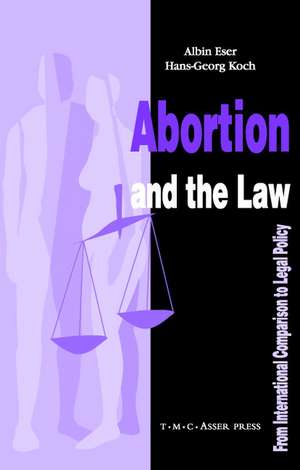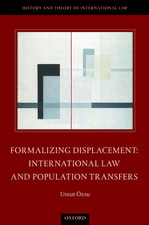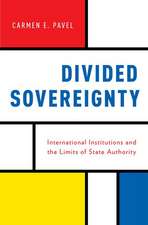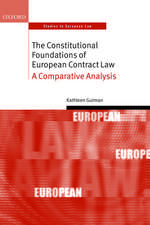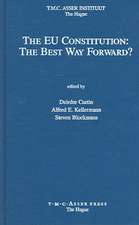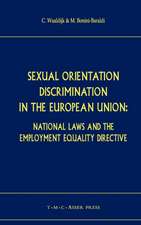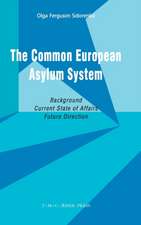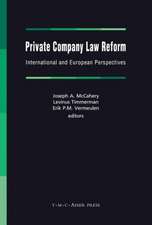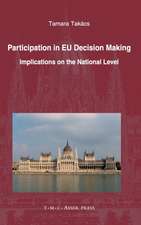Abortion and the Law: From International Comparison to Legal Policy
Autor Albin Eser, Hans-Georg Kochen Limba Engleză Hardback – 27 iul 2005
Abortion is a quasi-eternal problem of humanity. For decades it has been – and continues to be – a highly debated political and legal issue in the Western world on both sides of the Atlantic.
The contending political camps are often defined as ‘pro-life’ or ‘pro-choice’. From a more legal perspective, the opposing positions may be described by the terms ‘indication model’ – where terminations are permitted in certain circumstances – and ‘time limitation model’ – where termination within a certain period of pregnancy is permitted on demand. Based upon a worldwide survey on abortion law and practice in a total of 64 countries carried out by the Max-Planck Institute for Foreign and International Criminal Law in Freiburg (Germany), the authors developed a ‘third way’. This ‘third way’, which may be described as a ‘discourse model’, reflects the conviction that the decision to terminate must, in the final analysis, be taken by the pregnant woman herself subject to her own responsibility and that the legal system must treat her decision with respect.
Along with a summary of social conditions and historical developments and a detailed comparison of legal regulations, supplemented by statistics on the termination of pregnancy, the authors arrive at their concluding reflections. Important findings, insights and trends are summarized and starting points and guidelines for reforms are pointed out. The book ends with a proposed regulation intended to provide those interested in an optimal regulation of the issue with food for thought.
Prof. Dr. Dr. h.c. mult., M.C.J. (New York) Albin Eser is presently a Judge at the International Criminal Tribunal for the former Yugoslavia and Director em. of the Max-Planck-Institute for Foreign and International Criminal Law, Freiburg, Germany. Dr. jur. Hans-Georg Koch is senior researcher, Head of the medical law department of the Max-Planck-Institute for Foreign and International Criminal Law, Freiburg, Germany.
The contending political camps are often defined as ‘pro-life’ or ‘pro-choice’. From a more legal perspective, the opposing positions may be described by the terms ‘indication model’ – where terminations are permitted in certain circumstances – and ‘time limitation model’ – where termination within a certain period of pregnancy is permitted on demand. Based upon a worldwide survey on abortion law and practice in a total of 64 countries carried out by the Max-Planck Institute for Foreign and International Criminal Law in Freiburg (Germany), the authors developed a ‘third way’. This ‘third way’, which may be described as a ‘discourse model’, reflects the conviction that the decision to terminate must, in the final analysis, be taken by the pregnant woman herself subject to her own responsibility and that the legal system must treat her decision with respect.
Along with a summary of social conditions and historical developments and a detailed comparison of legal regulations, supplemented by statistics on the termination of pregnancy, the authors arrive at their concluding reflections. Important findings, insights and trends are summarized and starting points and guidelines for reforms are pointed out. The book ends with a proposed regulation intended to provide those interested in an optimal regulation of the issue with food for thought.
Prof. Dr. Dr. h.c. mult., M.C.J. (New York) Albin Eser is presently a Judge at the International Criminal Tribunal for the former Yugoslavia and Director em. of the Max-Planck-Institute for Foreign and International Criminal Law, Freiburg, Germany. Dr. jur. Hans-Georg Koch is senior researcher, Head of the medical law department of the Max-Planck-Institute for Foreign and International Criminal Law, Freiburg, Germany.
Preț: 899.21 lei
Preț vechi: 1096.60 lei
-18% Nou
Puncte Express: 1349
Preț estimativ în valută:
172.06€ • 179.65$ • 142.40£
172.06€ • 179.65$ • 142.40£
Carte tipărită la comandă
Livrare economică 04-18 aprilie
Preluare comenzi: 021 569.72.76
Specificații
ISBN-13: 9789067041973
ISBN-10: 9067041971
Pagini: 325
Ilustrații: 348 p.
Greutate: 0.68 kg
Ediția:1st Edition.
Editura: T.M.C. Asser Press
Colecția T.M.C. Asser Press
Locul publicării:The Hague, Germany
ISBN-10: 9067041971
Pagini: 325
Ilustrații: 348 p.
Greutate: 0.68 kg
Ediția:1st Edition.
Editura: T.M.C. Asser Press
Colecția T.M.C. Asser Press
Locul publicării:The Hague, Germany
Public țintă
ResearchCuprins
Framework.- I.2 System and Standard of Social Services.- The Position of Women in Society.- Assessment and Significance of Family Planning and Termination of Pregnancy.- Remarks on Historical Developments.- Current Laws Regulating the Termination of Pregnancy.- II. 1 Legal Sources and Regulatory Methodology Behind the Law on the Termination of Pregnancy.- Basic Concepts in Legal Regulation.- Permissible Termination Of Pregnancy.- Impermissible Termination of Pregnancy.- Special Role of the Physician.- Preventive Measures.- II. 7 Role of Termination of Pregnancy in the Prosecutorial Arena.- Statistical Information.- Termination Statistics.- Crime Statistics.- Judicial Statistics and Trends in Prosecution.- Concluding Reflections From A Legal Policy Perspective.- Preliminary Remarks.- Review: Findings — Insights — Trends.- Outlook: Starting Points — Guidelines.- A Proposed Regulation.
Recenzii
Textul de pe ultima copertă
Abortion is a quasi-eternal problem of humanity. For decades it has been – and continues to be – a highly debated political and legal issue in the Western world on both sides of the Atlantic.
The contending political camps are often defined as ‘pro-life’ or ‘pro-choice’. From a more legal perspective, the opposing positions may be described by the terms ‘indication model’ – where terminations are permitted in certain circumstances – and ‘time limitation model’ – where termination within a certain period of pregnancy is permitted on demand. Based upon a worldwide survey on abortion law and practice in a total of 64 countries carried out by the Max-Planck Institute for Foreign and International Criminal Law in Freiburg (Germany), the authors developed a ‘third way’. This ‘third way’, which may be described as a ‘discourse model’, reflects the conviction that the decision to terminate must, in the final analysis, be taken by the pregnant woman herself subject to her own responsibility and that the legal system must treat her decision with respect.
Along with a summary of social conditions and historical developments and a detailed comparison of legal regulations, supplemented by statistics on the termination of pregnancy, the authors arrive at their concluding reflections. Important findings, insights and trends are summarized and starting points and guidelines for reforms are pointed out. The book ends with a proposed regulation intended to provide those interested in an optimal regulation of the issue with food for thought.
Prof. Dr. Dr. h.c. mult., M.C.J. (New York) Albin Eser is presently a Judge at the International Criminal Tribunal for the former Yugoslavia and Director em. of the Max-Planck-Institute for Foreign and International Criminal Law, Freiburg, Germany. Dr. jur. Hans-Georg Koch is senior researcher, Head of the medical law department of the Max-Planck-Institute for Foreign and International Criminal Law, Freiburg, Germany.
The contending political camps are often defined as ‘pro-life’ or ‘pro-choice’. From a more legal perspective, the opposing positions may be described by the terms ‘indication model’ – where terminations are permitted in certain circumstances – and ‘time limitation model’ – where termination within a certain period of pregnancy is permitted on demand. Based upon a worldwide survey on abortion law and practice in a total of 64 countries carried out by the Max-Planck Institute for Foreign and International Criminal Law in Freiburg (Germany), the authors developed a ‘third way’. This ‘third way’, which may be described as a ‘discourse model’, reflects the conviction that the decision to terminate must, in the final analysis, be taken by the pregnant woman herself subject to her own responsibility and that the legal system must treat her decision with respect.
Along with a summary of social conditions and historical developments and a detailed comparison of legal regulations, supplemented by statistics on the termination of pregnancy, the authors arrive at their concluding reflections. Important findings, insights and trends are summarized and starting points and guidelines for reforms are pointed out. The book ends with a proposed regulation intended to provide those interested in an optimal regulation of the issue with food for thought.
Prof. Dr. Dr. h.c. mult., M.C.J. (New York) Albin Eser is presently a Judge at the International Criminal Tribunal for the former Yugoslavia and Director em. of the Max-Planck-Institute for Foreign and International Criminal Law, Freiburg, Germany. Dr. jur. Hans-Georg Koch is senior researcher, Head of the medical law department of the Max-Planck-Institute for Foreign and International Criminal Law, Freiburg, Germany.
Caracteristici
Notă biografică
Director of the Max-Planck Institute for Foreign and International Penal Law, Freiburg, Germany.
